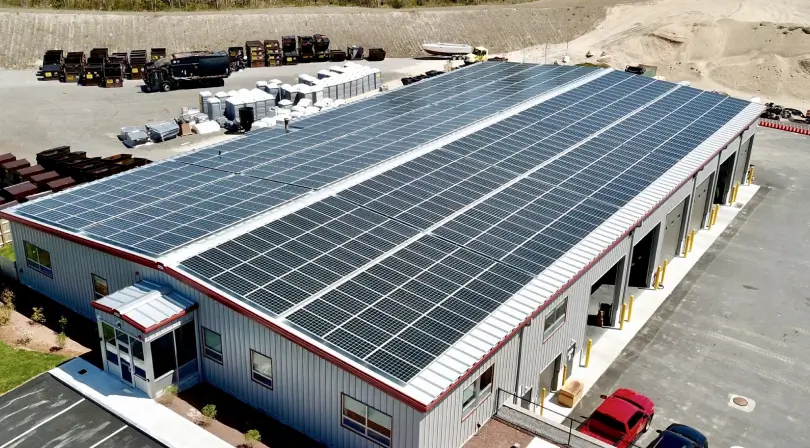Discover Industrial Solar Energy Solutions to boost efficiency, cut costs, and harness the power of the sun for sustainable, reliable energy in your business. In an era where environmental sustainability is at the forefront of global consciousness, businesses are increasingly turning to renewable energy solutions to power their operations. Among these, solar energy stands out as a particularly promising option for commercial establishments seeking to reduce their carbon footprint while also cutting down on energy costs. Commercial solar solutions have emerged as a viable and increasingly popular choice for businesses looking to embrace clean energy while improving their bottom line.
The Rise of Commercial Solar Solutions
The adoption of solar power by commercial entities has seen a significant uptick in recent years, driven by several factors. One of the primary drivers is the decreasing cost of solar technology. Advances in photovoltaic (PV) technology, coupled with economies of scale in manufacturing, have led to a substantial reduction in the cost of solar panels and related equipment. This cost reduction has made solar energy more accessible to businesses of all sizes, allowing them to install solar systems with shorter payback periods and higher returns on investment.
RELATED : COMMERCIAL SITE
Additionally, governments and regulatory bodies in many regions have introduced incentives and subsidies to encourage the adoption of solar power. These incentives often come in the form of tax credits, grants, or favorable financing options, further reducing the financial barriers to entry for businesses looking to invest in solar energy.
Benefits of Commercial Solar Solutions
The benefits of adopting commercial solar solutions are manifold, extending beyond environmental considerations to encompass economic and operational advantages as well.
- Cost Savings: By generating their own electricity from solar panels, businesses can significantly reduce their reliance on grid-supplied power, thereby lowering their energy bills. Over time, the savings realized from reduced energy costs can offset the initial investment in solar infrastructure, resulting in long-term financial benefits.
- Predictable Energy Costs: Unlike traditional energy sources, the cost of solar energy remains relatively stable once the solar system is installed. This predictability allows businesses to better forecast their energy expenses and mitigate the risk of price volatility in the energy market.
- Environmental Impact: By harnessing the power of the sun, commercial solar solutions help businesses reduce their carbon footprint and decrease their reliance on fossil fuels. This environmentally friendly approach not only contributes to mitigating climate change but also enhances the corporate social responsibility profile of the business.
- Energy Independence: Investing in solar energy affords businesses a greater degree of energy independence by reducing their dependence on external energy suppliers. This can be particularly advantageous during periods of peak energy demand or in regions prone to power outages or grid instability.
- Brand Enhancement: Adopting renewable energy solutions such as solar power can enhance a company’s brand image by signaling its commitment to sustainability and environmental stewardship. This can resonate positively with environmentally conscious consumers and stakeholders, potentially leading to increased brand loyalty and market differentiation.
Related: Solar LED Street Light
Considerations for Implementation
While the benefits of commercial solar solutions are compelling, businesses should carefully consider several factors before proceeding with implementation:
- Site Assessment: Conducting a thorough site assessment is essential to determine the feasibility of installing a solar system. Factors such as roof orientation, available space, shading, and local weather conditions can impact the performance and efficiency of the solar panels.
- Regulatory and Permitting Requirements: Businesses must familiarize themselves with local regulations, zoning laws, and permitting requirements governing the installation of solar systems. Compliance with these regulations is crucial to avoid potential legal issues and delays in the project timeline.
- Financial Analysis: A comprehensive financial analysis should be conducted to assess the upfront costs, expected savings, payback period, and return on investment associated with installing a commercial solar system. Businesses should also explore available incentives, tax credits, and financing options to optimize the financial feasibility of the project.
- Maintenance and Monitoring: Regular maintenance and monitoring are essential to ensure the optimal performance and longevity of the solar system. Businesses should establish protocols for routine inspections, cleaning, and maintenance to maximize the lifespan and efficiency of their solar infrastructure.
- Integration with Existing Infrastructure: Integration of the solar system with existing electrical infrastructure and energy management systems is critical to ensure seamless operation and compatibility with the business’s operations and energy needs.
Conclusion
Commercial solar solutions offer businesses a compelling opportunity to embrace renewable energy, reduce operating costs, and enhance their environmental sustainability credentials. With advancements in technology, declining costs, and supportive regulatory frameworks, solar power has become an increasingly viable option for businesses seeking to transition towards cleaner and more sustainable energy sources. By carefully evaluating the feasibility, costs, and benefits of commercial solar solutions, businesses can make informed decisions that align with their financial, operational, and environmental objectives, paving the way for a brighter and more sustainable future.

